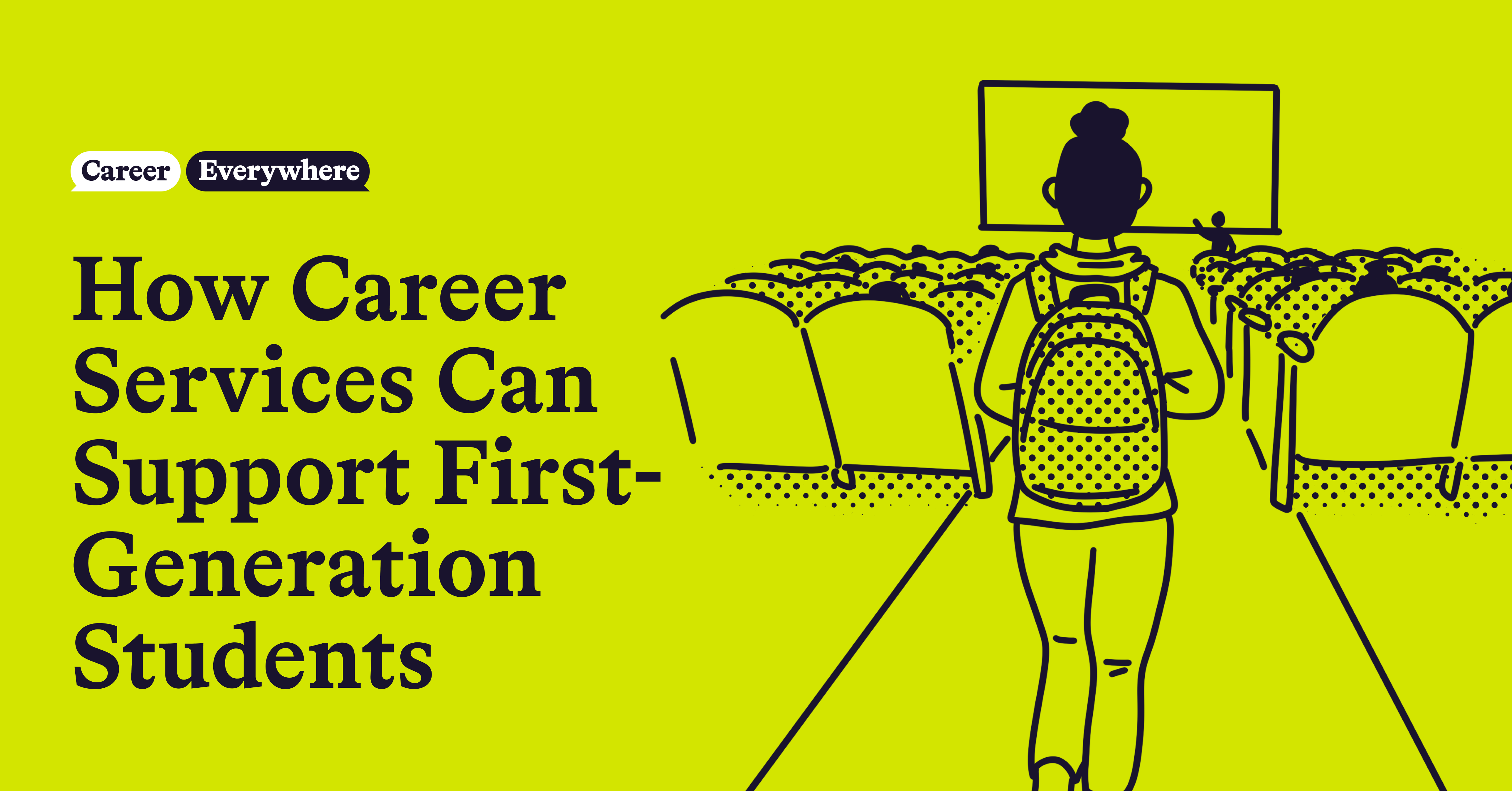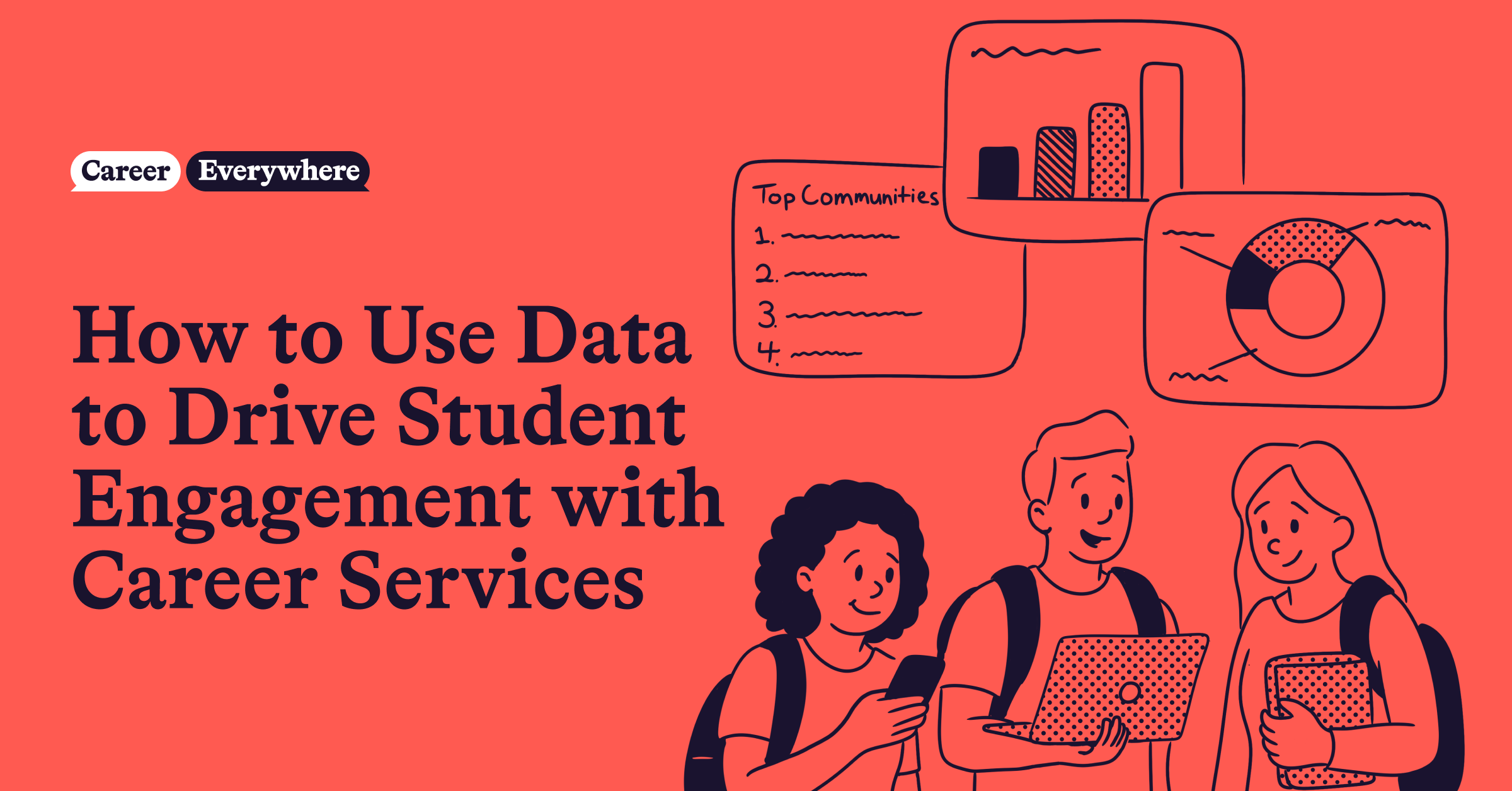
First-generation students face unique challenges when it comes to higher education and career exploration. They don’t typically have the same social capital and resources that other students have with parents who have been through higher education and can give direction on how to succeed academically, network, navigate resources, etc.

Many first-generation students don’t know what a career center is or what services they offer, for example.
So how can career services teams engage first-generation students and make sure they have what they need to succeed? To find out, we recently talked with Yasi Mahallaty, Senior Manager of Strategic Innovation at CareerSpring, a free networking and job placement platform for first-generation/low-income students.
A first-generation student herself, Mahallaty talks about the challenges first-generation students face when it comes to career exploration and offers several tactical strategies to help career services teams better support first-generation students on campus.
Learn more from Mahallaty in her episode of the Career Everywhere podcast.
What unique challenges do first-generation students face when it comes to career exploration?
First-generation students come from a wide variety of backgrounds and circumstances, so no first-gen story is exactly the same. However, there are some common experiences and challenges that career services teams can keep in mind as they work with first-generation students.
1. Lack of familiarity and guidance
As the first in their families to navigate higher education, first-generation students often lack guidance from family members who understand the complexities of the college experience, including the career exploration process—and how important it is to engage with the career center early. This can make it daunting for them to identify and pursue career opportunities, particularly in fields that are unfamiliar to them or their communities.
2. Competing responsibilities
Many first-generation students carry significant responsibilities outside of their academic life, such as working to support their families or serving as caretakers. These obligations can limit their time and energy for exploring career options, networking, and participating in extracurricular activities that could enhance their career prospects and strengthen their appeal as admitted students or future employees.
3. Sense of isolation and imposter phenomenon
First-generation students may experience isolation and feelings of being out of place, especially when surrounded by peers who have different economic or familial backgrounds. This can affect their sense of belonging and confidence, making it harder for them to seek help or take advantage of resources like the career center.
4. Limited professional networks
Unlike peers who may come from families with a history of higher education attendance, first-generation students often do not have access to established professional networks through family or community connections. This lack of a network can hinder their ability to secure internships, job opportunities, or mentorship that could guide their career paths toward success and growth.
5. Narrow perception of career options
Many first-generation students might enter college with a limited understanding of available career options, often influenced by their families’ perceptions of success (e.g., becoming a doctor, lawyer, or engineer). This view can limit their exploration of other potential career paths that align more with their interests and skills.
6. Concerns about marginalization
There is also a concern that first-generation students may be perceived as “diversity hires” and may feel underqualified for certain roles, especially when they do not meet every qualification listed in a job description. This can deter them from applying for positions they might not only qualify for, but excel in.
Despite these challenges, first-generation students often possess highly-valued qualities like adaptability, persistence, and responsibility. However, they may need encouragement to recognize and leverage these strengths in their career development.
“They’re motivated. They see themselves as persistent, responsible, self-reliant, and adaptable. They’re not entitled. Although I always joke, I want my students to be more entitled. I want them to go out and feel like they deserve all the resources given to them,” Mahallaty said. “These are all things that employers really value. If I were a hiring manager, I would want someone adaptable, someone who’s hard-working, someone who isn’t entitled in a bad way.”
Overall, these challenges highlight the need for targeted support systems that address the specific barriers first-generation students face in career exploration, helping them build confidence, expand their networks, and explore a broader range of career opportunities.
“First-gen students aren’t a monolith,” Mahallaty said. “They come in all races, all ages, very different types of communities, urban, rural, everything in between.”
As a first-generation student herself, Mahallaty can relate to, and has directly experienced, the challenges these students face in higher education. Wanting to foster her independence, and not feeling comfortable asking for help when needed, she braved her own journey through financial hardships and feelings of isolation as she attempted to fit into her campus community.
When it comes to offering advice to those in a similar situation, she encourages students to be resourceful and actively take pride in their identity as first-generation students.
“I’m just now, in the middle of my career, coming to terms with it. There’s no value judgment on that. It’s not a good or bad thing, it’s just the experience that made me who I am today,” Mahallaty said. “I try to encourage students to think about that too, right? There’s no good or bad, it’s just the circumstances and you can actually capitalize on that to be successful.”
How can career services teams best support first-generation students?
Simply understanding the unique experiences of first-generation students is a great place to start. But there are also many strategies, programs, and services that career centers can offer first-generation students to engage them, make them feel comfortable, and set them up for academic and career success.
Here are five recommendations from Mahallaty:
1. Leverage partnerships on- and off-campus to tailor programming and resources
To create the most effective programming and tailored resources for first-generation students, career teams should prioritize building strong partnerships with departments across campus that first-generation students already use and trust. This could include first-generation offices, scholarship offices, or student support services. By co-hosting events like career exploration workshops or resumé reviews with these departments, career services can boost engagement and participation among first-generation students and ensure the content is relevant.
Fostering a strong sense of belonging is also crucial. Creating programming that emphasizes relationship-building and a welcoming environment helps first-generation students feel more comfortable engaging with career services. Hosting informal meet-and-greet sessions or career-related social events can reduce feelings of isolation and increase their connection to campus resources.
Engaging first-generation alumni as role models and mentors is another effective strategy. Events where alumni share their career journeys, offer advice, and provide networking opportunities can bridge the gap between students and career resources. Recent graduates in particular can use their experiences to reassure and instill confidence in new students.
Utilizing trusted faculty and staff is important, as well. Students often rely on a few trusted individuals for advice throughout their educational journey. Training these faculty and staff to connect students with career services can ease the transition and encourage the use of these resources.
Finally, promoting awareness of career services through channels that first-generation students frequent is essential. Highlighting stories of first-generation students who have successfully used these resources can reinforce their value and encourage more students to take advantage of them.
2. Seek student feedback and use it to inform your engagement strategy
Encourage your career center team, academic advisors, faculty, staff, and other student support teams to talk directly with first-generation students about what resources they need most (or what they feel is missing).
Incorporating student feedback into the planning process not only ensures that programming is relevant but also empowers students by involving them directly. For example, forming a student board of first-generation upperclassmen who are enthusiastic about helping their peers can greatly enhance programming efforts. These students can serve as ambassadors and role models, spreading the word about events and resources through informal channels like word-of-mouth, which can be incredibly effective.
Collaboration should also include understanding the unique challenges that specific groups of first-generation students face, such as athletes who have demanding schedules. Finding ways to meet them where they are—whether that means coordinating with their practice times or holding events in locations they frequent—can make a significant difference in participation.
Finally, consider the importance of physical space and accessibility. Career services, for instance, might struggle to attract first-generation students into their offices, but taking the initiative to host events in places where students naturally congregate can lead to greater engagement.
3. Help first-generation students identify and articulate their specific skills and strengths
To help first-generation students identify and articulate their skills, start by helping them see the value in their campus experiences, both paid and unpaid. Many students overlook the relevance of their roles in clubs or student organizations when it comes to building a resume. By discussing how their tasks—like organizing events or leading a team—translate into valuable workplace skills, they can start to see their own strengths more clearly.
Sharing personal experiences, such as how involvement in student government unexpectedly prepared you for the professional world, can make this more relatable. Encourage them to think critically about how to present these experiences on their resumes, emphasizing that even roles in student clubs involve skills like leadership, organization, and communication that employers appreciate.
The goal is to help them understand that they are already building an impressive skill set and to give them the confidence to communicate this effectively to potential employers.
4. Help first-generation students identify and address any skills or competencies they might be missing
To help first-generation students fill any skill gaps, Mahallaty recommends career teams encourage first-generation students to embrace self-promotion.
Many students feel uncomfortable talking about themselves, fearing it might come off as bragging.
As Mahallaty said, “You deserve to do that… Let’s talk about how we can leverage your skills and personality.”
It’s important to help them understand that selling themselves is a crucial part of the interview process and that it’s okay (great, even!) to feel confident in their abilities.
Networking is another area where students often struggle. They hear the term frequently but might not know how to start. Instead of just telling them to “go out and network,” provide clear pathways, like organizing events where they can meet professionals willing to mentor them.
This approach gives students a safe space to practice their networking skills. For example, a speed networking event can help students make connections and build confidence in a supportive environment. By creating opportunities for them to engage directly with professionals, you can help students overcome the initial hurdles of networking and better prepare them for future success.
5. Meet first-generation students where they are
To effectively support first-generation students, it’s crucial to meet them where they are—both physically and in terms of their needs.
Many students might feel intimidated or uncertain about accessing campus resources like career services, the writing center, or the math center. By bringing these services directly to the students, whether it’s in dorms, study spaces, or other common areas, you can make these resources more accessible and less intimidating.
Additionally, there’s value in collaborating with those who regularly interact with students, such as faculty advisors or on-campus job supervisors. These folks often have meaningful relationships with students and can play a key role in their career exploration.
For instance, supervisors can incorporate career development discussions into their regular interactions, helping students think about life after graduation. This approach not only provides practical support but also ensures that students receive guidance in a familiar and comfortable environment. By partnering with those already in students’ daily lives, you can create more natural and effective support networks.
Conclusion
Career services must adapt to effectively support first-generation students, who often face unique challenges like limited guidance, unfamiliarity with career resources, and competing responsibilities. These students might not have the same support networks or understanding of career services that others do, making their journey more daunting.
By focusing on meeting students where they are, collaborating with trusted campus figures, creating tailored programming, helping students recognize and articulate their skills, and more, career teams can help first-generation students significantly enhance their career development.
To learn more from Mahallaty about how to best support first-generation students, check out her episode of the Career Everywhere podcast.


